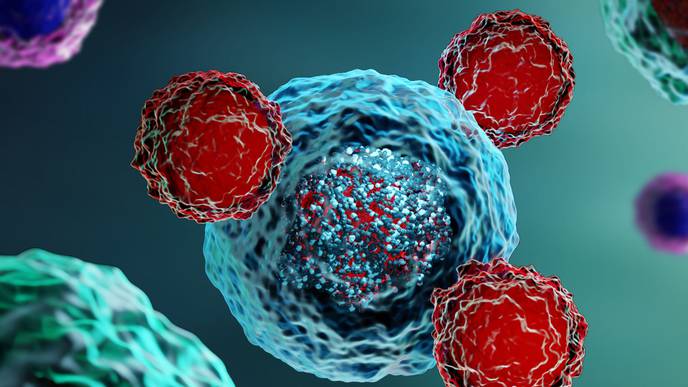ReachMD
Be part of the knowledge.™Immunotherapy Strongly Improves Prognosis of Babies with Leukemia

Three quarters of babies with acute lymphoblastic leukaemia (ALL) – three babies a year in the Netherlands – have a particular fault in the DNA of their leukaemia cells.
This so-called KMT2A rearrangement leads to an aggressive form of ALL with a poor prognosis.
Despite intensifying chemotherapy, the prognosis for these babies has not improved in recent decades.
Intensive chemotherapy works very well for half of the babies.
But in the other half of the children, the disease returned within two years, or children died from the disease or sometimes from the side effects of the therapy.
90% of recurrences – when the cancer comes back – occur during the two-year course of therapy.
Immunotherapy with the drug blinatumomab is already offered to some adults and older children with ALL.
It was still unclear whether this treatment is also well tolerated and effective in babies.
Blinatumomab binds to leukaemia cells on one side and to immune cells on the other side.
This connects the immune cells to the leukaemia cells and clears them up.
International clinical trial
Researchers at the Princess Máxima Center for paediatric oncology in the Netherlands led an international clinical trial looking at the safety and effectiveness of blinatumomab in babies with ALL.
Between 2018 and 2021, 30 children in 9 countries were treated with blinatumomab.
This was added to the existing chemotherapy treatment, the so-called Interfant-06 protocol.
The team compared the outcomes with those of 214 children who had been treated in previous years with the Interfant-06 standard therapy: the same treatment, without blinatumomab.
Significant improvement
The survival rate of babies who received one month of immunotherapy in addition to chemotherapy was significantly higher: 93% of them were still alive two years after diagnosis, compared with 66% of children who had only been treated with chemotherapy in the past.
This brings the survival of the babies with a KMT2A rearrangement in their leukaemia cells to the level of the average survival of older children with this form of blood cancer.
Two years after diagnosis, 18% of babies treated with blinatumomab saw their cancer come back, or died from their disease.
This also indicates a strong improvement compared with babies treated within the Interfant-06 protocol, without immunotherapy.
In that group, 51% had a recurrence or death during the two-year treatment with chemotherapy.
The results of the international clinical trial were published today (Wednesday) in the prestigious New England Journal of Medicine.
The study was funded by the Princess Máxima Center Foundation and the pharmaceutical company Amgen.
Dr. Inge van der Sluis, paediatric oncologist and clinical pharmacologist at the Princess Máxima Center for paediatric oncology, led the clinical study. She says:
‘It’s fantastic to see that we have made such progress for babies with ALL: the addition of immunotherapy to chemotherapy leads to much better survival and fewer side effects. We were already familiar with this immunotherapy from studies in other patient groups. This is the first time that we tested blinatumomab as a first-line treatment, and for the first time in such young children.'
‘This was a small study, but with a clear enough result that all babies with this form of leukaemia are now receiving immunotherapy as part of standard treatment. We want to confirm the effect of blinatumomab in a larger study with more children. We also want to see whether babies benefit from two courses of blinatumomab and a reduction in chemotherapy, in order to improve their quality of life even further.’
Prof. dr. Rob Pieters, medical director and paediatric oncologist at the Princess Máxima Center for paediatric oncology, leads the research group that carried out the study. He says:
‘The survival of children with acute lymphoblastic leukaemia has risen to more than 90% in recent decades, but the cure rate for babies has lagged behind. These young children are much more likely to have an aggressive form of the disease. That's why in 1999 we founded a large international collaboration of more than 25 countries, looking for improvements in treatment.'
‘Babies with leukaemia often have a recurrence early in treatment. That’s why it was important to give the immunotherapy right at the start of the treatment. It’s wonderful to see that this is yielding such a good result, and that we are implementing the addition of immunotherapy into worldwide standard treatment straight away.’
Facebook Comments